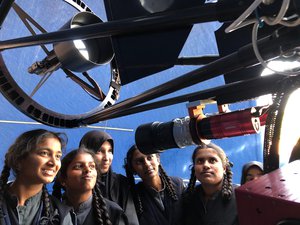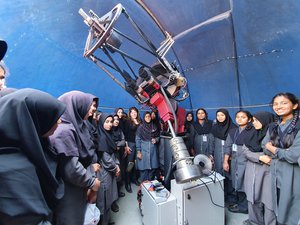Remote-controlled observatories keep their eyes on the heavens
" I am persuaded that reaching out to students in these different countries is playing an important part in raising up the next generation of globally astute, scientifically literate young people " Professor Katherine Blundell OBE
 I am a Research Fellow at St John’s College, and my field is Astrophysics. My research interests include extreme energetic events in the Universe and in particular those that take place in our Galaxy. Many such events in our Galaxy evolve rapidly, on timescales of merely hours and days. The important stages in these swiftly-changing phenomena would be missed if they were monitored only by a single dedicated telescope at a fixed longitude and latitude because astronomy can only take place at nighttime when the sun is below the horizon. Daylight puts a stop to astronomy!
I am a Research Fellow at St John’s College, and my field is Astrophysics. My research interests include extreme energetic events in the Universe and in particular those that take place in our Galaxy. Many such events in our Galaxy evolve rapidly, on timescales of merely hours and days. The important stages in these swiftly-changing phenomena would be missed if they were monitored only by a single dedicated telescope at a fixed longitude and latitude because astronomy can only take place at nighttime when the sun is below the horizon. Daylight puts a stop to astronomy!
To overcome this limitation, I established a multi-longitude network of five telescopes located in South Africa, Chile, both ends of Australia and in southern India. These telescopes deliver data-streams for me and my DPhil students in Oxford but in addition by design they engage young people, particularly girls, in the residential schools that host the observatories. To hear interviews with some of the schoolgirls, please watch this 3-minute video introduction to the Global Jet Watch observatories.
In part because of my interests in extreme energies, I also care a great deal about security of energy supply on this planet. For the 450th Anniversary of the founding of St John’s College, Professor Fraser Armstrong and I ran a one-day workshop entitled “Energy beyond Oil” anticipating 4.5 centuries hence when the world’s usage of fossil fuels would be long over.
 In line with this, and to solve the problem of dangerous local mains electricity at the school in India where our observatory is located, I built a solar farm on top of the school roof next to the observatory, meaning this observatory is now entirely powered by our nearest star! The building of a solar farm to similarly power the observatory at the school in South Africa had been scheduled for late April, thanks to a generous donation by an alumnus of St John's, but has had to be postponed due to the current lockdown for the coronavirus pandemic.
In line with this, and to solve the problem of dangerous local mains electricity at the school in India where our observatory is located, I built a solar farm on top of the school roof next to the observatory, meaning this observatory is now entirely powered by our nearest star! The building of a solar farm to similarly power the observatory at the school in South Africa had been scheduled for late April, thanks to a generous donation by an alumnus of St John's, but has had to be postponed due to the current lockdown for the coronavirus pandemic.
I am very conscious of how privileged we are in the UK to have largely reliable electricity, clean water and safe food. Our world needs a lot of love at present, and I am persuaded that reaching out to students in these different countries is playing an important part in raising up the next generation of globally astute, scientifically literate young people. I aspire to relay much more of the activities of the Global Jet Watch in a virtual way over the internet, and increase our reach — via the internet — further still.
Last year I was elected Gresham Professor in Astronomy and as part of this I deliver lectures (entirely accessible for those without a background in Physics). My inaugural lecture "Faster than Light” is available here and a lecture featuring the Global Jet Watch entitled “the End of Matter” is available here.
The Development and Alumni Relations Office is grateful to Professor Katherine Blundell OBE for providing this report on her work. If you would be interested in knowing more, please email alumni@sjc.ox.ac.uk.